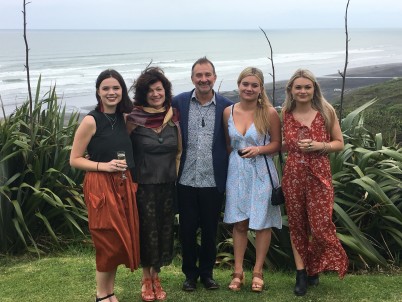For more than 30 years, Associate Professor Nigel Wilson of Starship Children’s Hospital has juggled working on the frontline as a paediatric cardiologist with carrying out groundbreaking research to help children in New Zealand and the Pacific Islands battling rheumatic fever and the damaging heart disease it can cause.
Now the Health Research Council (HRC) has recognised Associate Professor Wilson’s huge contribution to improving rheumatic fever and rheumatic heart disease outcomes by awarding him the HRC’s Beaven Medal for excellence in translational health research at the Royal Society Te Apārangi’s Research Honours event in Hamilton this evening.
About 40 million people worldwide have rheumatic heart disease, brought on by rheumatic fever, and some 300,000 people die from it each year. In New Zealand, an average of 150 predominately Māori and Pacific children are diagnosed with rheumatic fever each year.
In the early and mid-1990s, Dr Wilson and his colleagues at Auckland’s Green Lane Hospital found that Doppler echocardiography technology – which uses sound waves to show blood moving across the valves of the heart – was significantly better at detecting damaged heart valves in rheumatic fever than the traditional stethoscope.
This discovery informed the development of New Zealand’s guidelines for diagnosing and managing rheumatic fever, which Dr Wilson wrote alongside the late Professor Diana Lennon. Dr Wilson was also instrumental in developing the World Heart Federation criteria for diagnosing rheumatic heart disease using echocardiography, which have been widely adopted by clinicians around the world.
Following on from this work, he directed screening studies of high-risk populations in New Zealand schools using portable echocardiograms. These showed that about 1 percent of Māori children and 2 percent of Pacific children have ‘silent’ rheumatic heart disease.
“The usual pathway for acute rheumatic fever is a sore throat – or maybe a skin infection – caused by Group A Streptococcal bacteria. Only a few people go on to get rheumatic fever, half of whom will have permanent rheumatic heart disease,” explains Dr Wilson.
“However, there’s another completely different pathway where people have a silent episode of rheumatic fever, and the heart gets damaged in a small way. If someone has cumulative silent episodes, they will end up with life-shortening rheumatic heart disease. In New Zealand, about 40 per cent of those turning up to hospital with severe rheumatic heart disease have never had a recognised episode of rheumatic fever before.”
Dr Wilson’s research in this area has led to international collaborations to develop and promote echocardiographic screening protocols and criteria for diagnosing rheumatic heart disease. He was recently part of an international study showing that penicillin treatment prevents the progression of echo-detected mild rheumatic heart disease. This has led to renewed talks with the Ministry of Health about the steps needed to develop an echo screening programme for rheumatic heart disease in high prevalence areas in New Zealand.
“In 2017, we started the Heart Foundation-funded rheumatic heart disease registry project to define the prevalence of severe rheumatic heart disease in New Zealand. We closed the registry last year with 5,000 people, of which sadly, about 25 per cent have already died. We’re now linking this work to national data sets of hospital admissions, so we’ll soon have a much better idea what the rheumatic heart disease burden is in Aotearoa,” says Dr Wilson.
He says the Starship cardiac team champion valve repairs over valve replacements for children and young adults requiring heart surgery for rheumatic heart disease as their research has shown that valve repairs have better medical and lifestyle outcomes.
HRC Chief Executive Professor Sunny Collings says Dr Wilson’s research findings have been widely translated into routine healthcare and delivery practice.
“Nigel’s tireless advocacy for Māori and Pacific tamariki health and mentorship of cardiologists-in-training and emerging researchers in Aotearoa and the Pacific region make him an extremely worthy recipient of the Beaven Medal,” says Professor Collings.
“On an individual level and as a founding member of Pū Manawa, the Rheumatic Fever Network, he has advocated extensively for improved prevention and control measures for rheumatic fever around Aotearoa, particularly in Tairāwhiti, Northland, South Auckland, the Bay of Plenty and Porirua.”
“He has also made substantial contributions to efforts to control rheumatic heart disease in Fiji, establishing a better prevention and control programme there that has become a model for other countries with endemic rheumatic heart disease, and providing longstanding clinical support and echocardiography training to medical personnel in Samoa.”
With funding from CureKids, Dr Wilson and colleagues Dr Rachel Webb and Associate Professor Nikki Moreland at the University of Auckland are now testing recent Australian findings that hydroxychloroquine reduces inflammation in the blood of rheumatic fever patients and therefore the chances of developing rheumatic heart disease.
This preliminary work has led to a larger HRC-funded clinical trial, to be led by Dr Webb, that will involve about 150 New Zealand children with rheumatic fever. This could be a game-changer because although penicillin injections are proven to prevent relapses of rheumatic fever, there is still no proven treatment that effectively reduces the initial heart damage.
